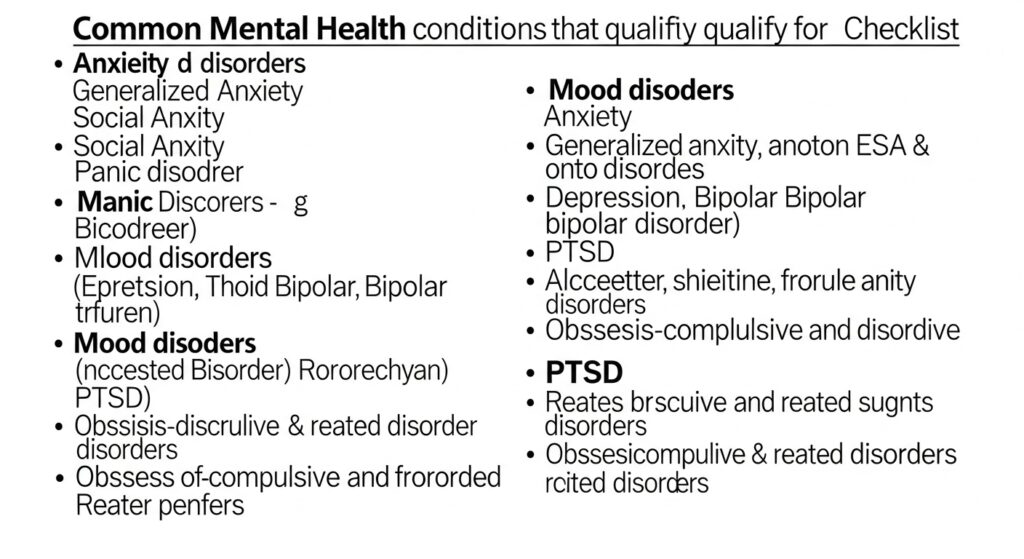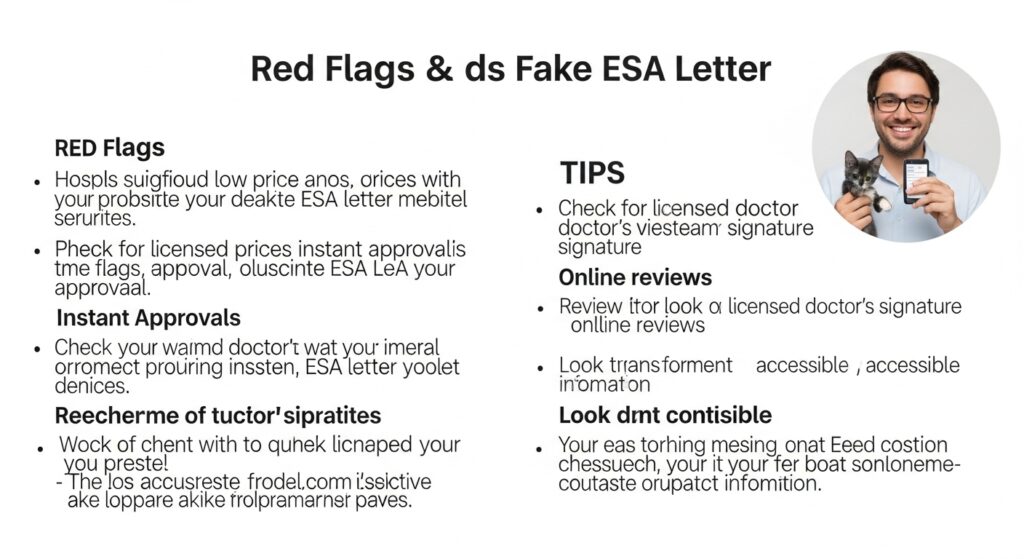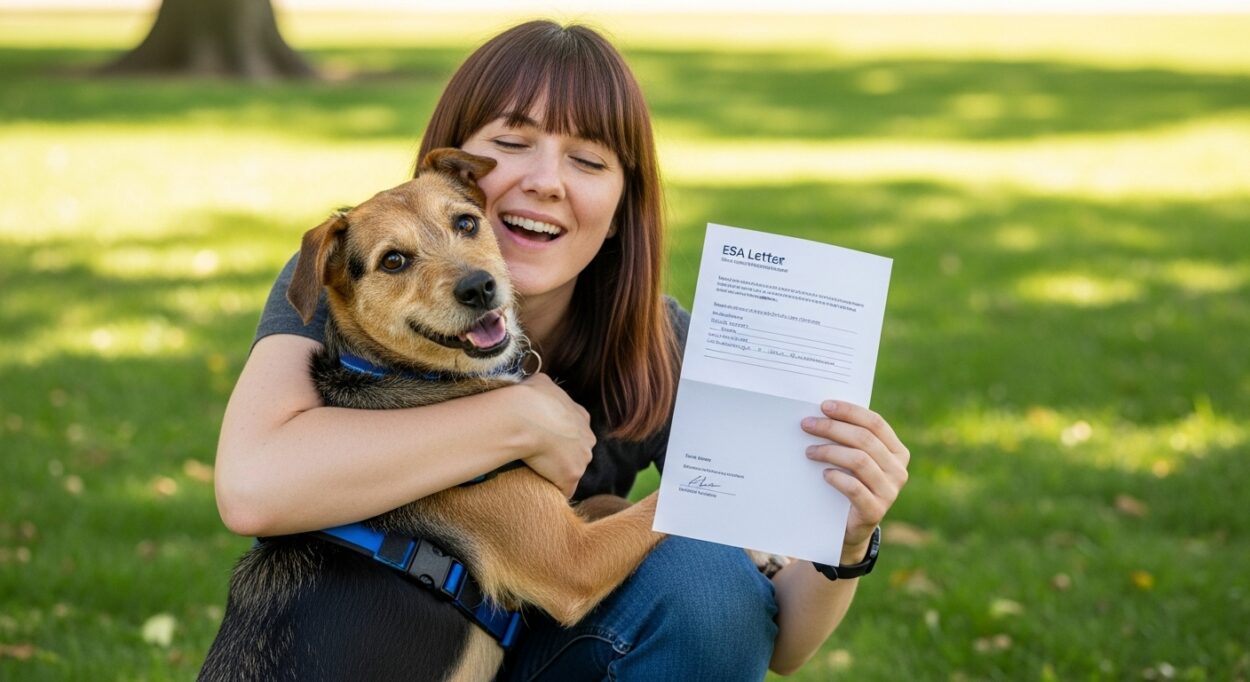Table of Contents
Introduction
Mental health is finally being recognized as just as important as physical health. If you’re struggling with anxiety, depression, PTSD, or other emotional challenges, you’re not alone. For many people, having an Emotional Support Animal (ESA) can be life-changing—providing companionship, reducing symptoms, and improving day-to-day life.
But before you can officially benefit from the legal protections that come with an ESA, you need a valid ESA letter from a licensed mental health professional. How do you really qualify for an ESA letter in 2025? What does the process look like? What are the rules and how do you avoid scams?
This in-depth guide explains how to qualify for an ESA letter, step-by-step, with everything you need for a smooth, legal process.

What is an ESA Letter?
Before diving into qualifications, let’s clarify what an ESA letter actually is.
An ESA letter is a prescription or recommendation from a licensed mental health professional (such as a psychologist, therapist, psychiatrist, or licensed clinical social worker) stating that your animal provides therapeutic benefit for a mental or emotional condition.
Key Features:
- It must be written on official letterhead.
- Includes the provider’s license number, contact information, and date.
- States that you have a qualifying condition and that the ESA is part of your treatment.
- Typically must be renewed every year.
Having a legitimate ESA letter gives you certain legal protections, especially when it comes to housing—and sometimes travel.
Who Can Qualify for an ESA Letter in 2025?
Wondering if you could qualify? Here’s what professionals look for:
1. You Must Have a Qualifying Mental or Emotional Health Diagnosis
To qualify for an ESA letter, you need to be diagnosed with an emotional or mental health disability that substantially limits one or more major life activities.
Some common qualifying conditions include:
- Anxiety disorders
- Depression
- Post-traumatic stress disorder (PTSD)
- Panic disorders
- Social phobia/social anxiety
- Obsessive-compulsive disorder (OCD)
- Autism spectrum disorders
- Mood disorders
- Sleep disorders related to anxiety/depression
This is not a complete list. The key is that the condition must significantly impact your daily life.

2. The ESA Must Provide a Recognizable Benefit
You’ll need to show that your animal provides crucial emotional comfort and support that helps with your specific symptoms—such as reducing anxiety, promoting social engagement, or helping relieve feelings of isolation.
3. You Must Be Working with a Licensed Mental Health Professional
ESA letters can only be written by certain providers, such as:
- Psychologists
- Psychiatrists
- Licensed professional counselors
- Licensed clinical social workers
- Sometimes, certain physicians or nurse practitioners with behavioral health training
Tip: Online-only services are fine, IF they use real, licensed providers and conduct a legitimate evaluation.
Step-by-Step: How to Qualify for an ESA Letter
Here’s how to do it the right way, step-by-step:
1. Recognize Your Need
If you’re experiencing mental health challenges that affect your daily life, and you believe an animal offers relief, you might qualify.
2. Talk to Your Mental Health Provider
If you’re already seeing a therapist, psychiatrist, or counselor—start there! Explain how your animal helps and ask whether they believe an ESA would complement your treatment plan.
If you’re not seeing anyone: You’ll need to schedule an appointment with a licensed provider. In-person or legit telehealth (online video) both work in 2025.

3. Undergo a Proper Evaluation
A real professional will:
- Review your medical and mental health history
- Assess your symptoms
- Ask specifically how the animal helps
They may use standard screening forms or talk it through in session. Beware of sites that issue letters “no questions asked”—those are often scams.
4. Get the Official ESA Letter
If the provider believes an ESA would benefit your mental/emotional health, they write and sign an official ESA letter on their letterhead, with:
- Their license type and number
- Issuing state and date
- Your name (sometimes your animal’s name or type)
- Confirmation of your qualifying condition and the therapeutic basis for the ESA
You’ll receive a PDF or physical copy you can use for housing (and sometimes travel).
[Image Placeholder: “Example of a legitimate ESA letter with licensed provider info”]
5. Renew Your Letter Annually
Most housing providers require a new letter every 12 months. Plan ahead to maintain your legal protections.
Avoiding ESA Letter Scams (2025 Update)
Many “instant ESA letters online” are scams with no legal value. Here’s how to spot and avoid them:
- No Real Evaluation: If you can get a letter just by filling out a yes/no form, it’s likely invalid.
- No Licensed Professional: The letter must have the professional’s name, title, license number, and contact information.
- No Direct Contact: At least minimal video or phone consultation is a must—email or message-only doesn’t count in 2025’s regulations.
- Guaranteed Approval: Avoid sites that say “100% approval!” Real professionals only write letters when clinically appropriate.
Want to find legitimate providers online? Look for:
- HIPAA-compliant sites
- Clear provider credentials
- Transparent pricing
- Real customer reviews

Legal Protections Provided by an ESA Letter
A valid ESA letter gets you legal rights mainly under the Fair Housing Act (FHA) in the United States. This means:
- Landlords (including those with no-pet policies) must make reasonable accommodations for your ESA.
- They can’t charge you extra “pet rent” or deposits.
- They may ask for your ESA letter and, in some cases, limited verification from your health provider.
Note: As of 2025, airlines are NO LONGER required by U.S. law to allow ESAs in passenger cabins for free. ESA letters might still help with some smaller carriers or international airlines, but always check their latest policies.
Is There a “Test” for My Animal To Qualify?
Nope! Unlike service dogs, ESAs do not need special training or certification. Any animal that helps your mental health can be an ESA—but your provider must agree it’s an appropriate part of your care.
Frequently Asked Questions (FAQ)
Q1: How quickly can I get an ESA letter?
If you already see a mental health provider, sometimes within a week. With legit online evaluations, usually 24–72 hours after your video appointment.
Q2: Is an ESA letter valid for multiple animals?
Usually, providers will specify one animal. If more than one animal offers benefit, the letter should specifically mention each by name/type.
Q3: What if my landlord wants to call my provider?
Your provider can confirm that they wrote your letter, but they can’t disclose your diagnosis without your permission (HIPAA privacy).
Q4: Can I qualify for an ESA letter through online services?
Yes if you get a real evaluation from a licensed professional in your state. Avoid “instant approval” scam sites.
Q5: Does my dog (or cat, bird, etc.) need to be registered?
No. There’s NO national or official ESA registry. Your letter is your only legal documentation.
Q6: Can landlords deny my ESA request?
They can only refuse if the animal poses a direct threat or causes major damage, or if they are exempt from the FHA (e.g., certain small owner-occupied buildings).
Q7: How often should I renew my ESA letter?
Every 12 months is standard, but check with your housing provider for their policy.
Final Tips for Getting Your ESA Letter (2025)
- Start with a real, licensed mental health professional.
- Share honestly about your symptoms and how your animal supports you.
- Don’t rush—avoid instant “ESA letter” websites unless you can verify their legitimacy.
- Keep your ESA letter up to date—set a reminder to renew before it expires.

Conclusion
Qualifying for an ESA letter in 2025 is all about doing things the right way. With the mental health landscape changing and regulations getting stricter, your ESA letter must be written by a real professional after a real evaluation. That’s not just good for legal protection—it also means you and your animal are genuinely supported in your mental wellness journey.





Sign up